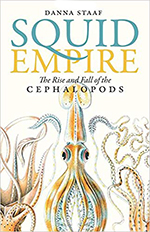3 April 2019
Squid Empire: The Rise and Fall of the Cephalopods, by Danna Staaf
Posted by Callan Bentley
 Here’s a cool little book about the paleobiology, ecology, and behavior of cephalopods: Squid Empire. The author, Danna Staaf, has a PhD in marine biology and –more importantly– a lifelong fascination with squid, octopuses, cuttlefish, and nautiloids. This work is a history of the cephalopod clade – going back into deep time, before the Cambrian Explosion, dwelling on ancestral forms and luxuriating in the ammonites (now sadly extinct — or are they?) and arriving at the modern day with its myriad oceanic perturbations. For those with an armchair interest in taxonomy, it’s a perfect treatment of the different major groups of cephalopods, and what distinguishes them. Sometimes this leads to profound realizations, such as how counting arms, and figuring out which of them are modified for which purposes, can reveal degrees of evolutionary relatedness. The “paper nautilus” (or argonaut) of modern oceans is thus revealed to be not a nautilus at all, but an octopus, which has the quirky habit of carrying around its stiff egg case and treating it as a shell. Unlike a true nautilus, it can drop it whenever it sees fit, and make another. The business with shells is full of endless possibilities for exploration, and shells are of course most of what we have to work with in the fossil record. Some interesting ideas about internal vs. external shells are presented, and I won’t give anything away here except to say that I learned a lot. The writing is fresh and vibrant, but doesn’t shirk scientific details. (e.g., readers will see “coleoid” frequently, and have to be okay with it. Likewise, you’ll learn the real names for various relevant anatomical structures and must be prepared to assimilate this vocabulary in order for the book’s further messages to sink in.) Squid Empire makes a nice partner volume to Other Minds, by Peter Godfrey-Smith, which I’ve reviewed here too. Godfrey-Smith’s book is about cephalopod social behavior and psychology, while Staff focuses more on anatomy, physiology, and ecology. Together, the two volumes provide fascinating insights into a group of intelligent organisms with whom we share the planet. They have occupied Earth’s oceans for hundreds of millions of years, and hopefully we will allow them to last into our shared future.
Here’s a cool little book about the paleobiology, ecology, and behavior of cephalopods: Squid Empire. The author, Danna Staaf, has a PhD in marine biology and –more importantly– a lifelong fascination with squid, octopuses, cuttlefish, and nautiloids. This work is a history of the cephalopod clade – going back into deep time, before the Cambrian Explosion, dwelling on ancestral forms and luxuriating in the ammonites (now sadly extinct — or are they?) and arriving at the modern day with its myriad oceanic perturbations. For those with an armchair interest in taxonomy, it’s a perfect treatment of the different major groups of cephalopods, and what distinguishes them. Sometimes this leads to profound realizations, such as how counting arms, and figuring out which of them are modified for which purposes, can reveal degrees of evolutionary relatedness. The “paper nautilus” (or argonaut) of modern oceans is thus revealed to be not a nautilus at all, but an octopus, which has the quirky habit of carrying around its stiff egg case and treating it as a shell. Unlike a true nautilus, it can drop it whenever it sees fit, and make another. The business with shells is full of endless possibilities for exploration, and shells are of course most of what we have to work with in the fossil record. Some interesting ideas about internal vs. external shells are presented, and I won’t give anything away here except to say that I learned a lot. The writing is fresh and vibrant, but doesn’t shirk scientific details. (e.g., readers will see “coleoid” frequently, and have to be okay with it. Likewise, you’ll learn the real names for various relevant anatomical structures and must be prepared to assimilate this vocabulary in order for the book’s further messages to sink in.) Squid Empire makes a nice partner volume to Other Minds, by Peter Godfrey-Smith, which I’ve reviewed here too. Godfrey-Smith’s book is about cephalopod social behavior and psychology, while Staff focuses more on anatomy, physiology, and ecology. Together, the two volumes provide fascinating insights into a group of intelligent organisms with whom we share the planet. They have occupied Earth’s oceans for hundreds of millions of years, and hopefully we will allow them to last into our shared future.


 Callan Bentley is Associate Professor of Geology at Piedmont Virginia Community College in Charlottesville, Virginia. He is a Fellow of the Geological Society of America. For his work on this blog, the National Association of Geoscience Teachers recognized him with the James Shea Award. He has also won the Outstanding Faculty Award from the State Council on Higher Education in Virginia, and the Biggs Award for Excellence in Geoscience Teaching from the Geoscience Education Division of the Geological Society of America. In previous years, Callan served as a contributing editor at EARTH magazine, President of the Geological Society of Washington and President the Geo2YC division of NAGT.
Callan Bentley is Associate Professor of Geology at Piedmont Virginia Community College in Charlottesville, Virginia. He is a Fellow of the Geological Society of America. For his work on this blog, the National Association of Geoscience Teachers recognized him with the James Shea Award. He has also won the Outstanding Faculty Award from the State Council on Higher Education in Virginia, and the Biggs Award for Excellence in Geoscience Teaching from the Geoscience Education Division of the Geological Society of America. In previous years, Callan served as a contributing editor at EARTH magazine, President of the Geological Society of Washington and President the Geo2YC division of NAGT.